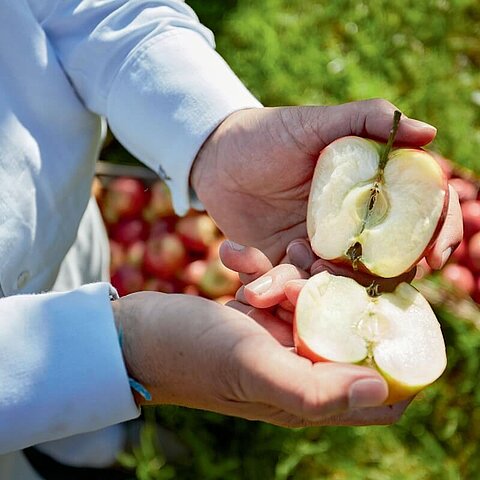
Why we are passionate about climate protection
Climate change is without a doubt one of the biggest challenges the world has ever faced, and only some of its long-term effects can be calculated today. We must all do our part to keep global warming to a minimum and intensify our efforts. Like other organisations, HiPP has set itself climate protection goals.
We have been committed to protecting and preserving the earth’s ecological balance for years, taking a holistic approach.
HiPP is a pioneer in organic farming and has used organic raw materials in the production of HiPP baby food for over 60 years. In organic farming, the use of synthetic mineral fertilisers is prohibited. A significant portion of the greenhouse gases generated by agriculture comes from energy-intensive fertiliser production. In contrast, organic farmers use high-quality organic fertilisers, such as compost, which reduce greenhouse gases and promote healthy soils. The positive effect of organic farming has been confirmed by the Thünen Institute in Germany.
We have been a successfully EMAS-validated company (Eco-Management and Audit Scheme) since 1995 and improved our environmental performance every year.
For further details, see here.

How does HiPP reduce and avoid emissions?
We reduce our emissions throughout the entire value chain by evaluating raw materials, packaging, logistics, product ranges and production sites concerning their impact on the climate. From this evaluation, we derive effective measures to cut greenhouse gas emissions. Together with our suppliers and partners, we continuously make improvements across our entire chain; improving and investing in renewable energy sources and energy efficiency allows us to effectively reduce the number of emissions that remain and need offsetting.
For further information on how we reduce emissions at our manufacturing sites, within our supply chain and packaging and how we offset remaining emissions, see here.
Climate protection through soil conservation
Agricultural lands, when intact, make a substantial contribution to preserving our ecosystems and protecting our climate. To fulfil this role, the soils need to have a high humus content and active soil life. Increasing the humus content is vital for soil fertility, erosion control, groundwater formation and flood protection, and it makes agriculture climate-resilient. Measures to promote humus, such as intercropping or green manure and compost application, are particularly beneficial. At HiPP, we are committed to increasing soil carbon storage and promoting and maintaining long-lasting soil health through sustainable organic farming practices. One of our focuses is on composting.
The composting process is a climate-friendly way for us to break down organic substances, and aerobic composting significantly reduces methane emissions compared to less climate-friendly rotting. Additionally, the resulting compost can be used as high-quality organic fertiliser, which contributes significantly to the soil structure.
This practice is a core pillar of the offsetting strategy we use in our local and global climate protection projects.
For around 20 years, entrepreneur and farmer Stefan Hipp has been running an organic farm in Poland where cattle manure is converted into valuable compost. By aerating the pile with a compost turner, organic material can be turned into humus in a controlled manner within eight to ten weeks. This aerobic method also significantly reduces methane emissions. By sharing the experience in carbon sequestration we’ve gained from our projects with our partners and raw material suppliers around the world, HiPP helps suppliers implement climate protection measures in their companies – because local nature preservation leads to global climate protection.
HiPP uses financial compensation to support these concepts at an operational level in the supply chain, which creates added value for the farmer, HiPP, nature and future generations. Our company’s climate protection measures can be seen within our agricultural supply chain.
For further information on how HiPP protects the climate through good soil, visit here.

Climate protection projects
HiPP is involved in various climate protection projects around the world, including in Cape Town and Zimbabwe.
Composting urban green waste in Cape Town
HiPP’s commitment to the South African metropolis of Cape Town demonstrates how 30,000 cubic metres of green waste per month can be made available for both urban landscaping and agriculture. To date, more than 10 million cubic metres of green waste have been processed into high-quality potting soil, preventing half a million tonnes of CO2 from escaping into the atmosphere. UNEP (United Nations Environment Programme) institutions have already openly recommended this HiPP-backed project as a way of offsetting emissions. The compost obtained from the project will be used to improve the soil for landscapers in the Cape Town region and farms in the Western Cape.
- Method: AMS III.E v. 7: ‘Avoidance of methane production from biomass decay through controlled combustion’ AMS III.F v. 5: ‘Avoidance of methane production from biomass decay through composting’
- Emissions are quantified according to the guidelines of the small-scale CDM methods.
- Certification standard and project registration: The Credible Carbon labelled RE_AW4MAUBT.
Forest protection project in Kariba, Zimbabwe
REDD+ (Reducing Emissions from Deforestation and Forest Degradation), plus sustainable forest management and maintaining and improving carbon stocks in forests: since this project was launched in 2011, the average annual reduction of CO2 has been over 3.5 million tonnes. The project provides farmers and the local population with additional sources of income and permanently improves living conditions in the region.
- Method: VM0007 REDD+ Methodology Framework (REDD+ MF) by VCS.
- Certification standard and project registration: The Verified Carbon Standard (VCS) from Verra.

